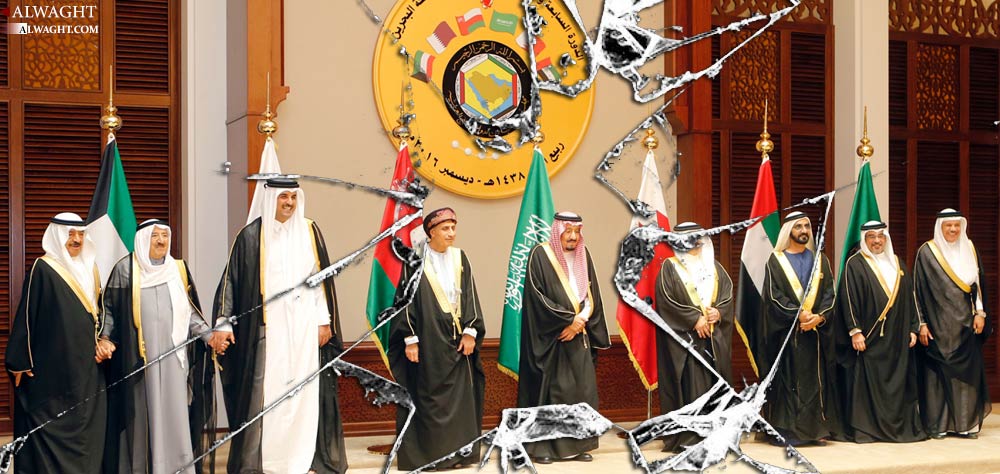Alwaght- In past few days and particularly following the last Monday official trip of Emir of Kuwait Sheikh Sabah Al-Ahmad Al-Jaber Al-Sabah to Oman that is said to be coming as part of efforts to stimulate negotiations between Iran and Persian Gulf Arab states, the divisions among the members of the (Persian) Gulf Cooperation Council (P)GCC once again resurfaced.
The Oman visit of the Kuwaiti emir has proved significant in accentuating the conflict of ideas among (P)GCC members. A day before, the Saudi Arabian Foreign Minster Adel al-Jubeir during his speeak at Munich Security Conference said that the (P)GCC will cooperate with Iran to settle the differences only if the Islamic Republic changes its regional policy of supporting its allies, in a reference to the members of Axis of Resistance, that includes Iran, Iraq, Syria, Lebanese Hezbollah and Palestinian resistance group. With this unfeasible condition, the Saudi official had closed the door to any possibility of talks. Moreover, the Iranian president’s visit to Oman and Kuwait, while the Turkish president was visiting Saudi Arabia, Qatar, and Bahrain, even pointed up the divisions that are hitting the six-nation Persian Gulf bloc.
The (Persian) Gulf Cooperation Council was founded in 1981 to address the political, military, and security atmosphere as well as the economic partnership necessities of the time. Notwithstanding a series of territorial and border disputes roughly among all member states of the council, it has managed to survive for over three decades on the strength of factors such as similar monarchical political systems, equal-sized areas, as well as territorial, demographic, lingual, and ethnic bonds.
But following arrival of South Asian developments deriving from the Islamic awakening that followed the 2011 Arab uprisings, the members took conflicting approaches and joined the regional competitions to fill the vacuum and keep secure against the uprisings and stop them from spreading to their nations. All these measures widened the deep gaps between the members of the Arab bloc and even helped intensify their divergence in next years. Some of the most important sticking points among the Arab Council on the shadow of the recent regional developments are as follows:
Arab uprisings and ideological differences
One of the leading bedrocks of ideological differences among the (P)GCC leaders can be searched in their different stances in dealing with the Muslim Brotherhood's ideology and also their support for the radical organizations in the region, specifically in Syria and Egypt. This struggle of approaches impacts the Council’s performance and the whole region. The root of rifts returns to the members' ideological understanding of the threats that challenge the region's security. In 2014, Saudi Arabia, Bahrain, and the UAE recalled their ambassadors to Qatar. They, for explanation, said that they disagreed with Doha leaders over financial and political backing for the Muslim Brotherhood that was since that year labelled a terrorist group by Riyadh.
Furthermore, the Syrian crisis proved how the ideological disputes between Saudi Arabia and Qatar, two leading Arab powers of the Persian Gulf, influenced the mutual dealings of the two sides. Oman has separated way from other members of the bloc as it rejected to join the so-called Operation Decisive Storm against Yemen. Earlier, a proposal of the Omani sultan for making a 100,000-troops Arab army had gone nowhere.
A failure to build capacity to provide the collective security, which is primary goal behind foundation of the (P)GCC, has led to tendency of the members to make large-scale military purchases and rely on mutual security alliances with the international powers. This issue stands for the fact that the Council’s potentials are smaller than being able to guarantee a collective security. In past few years, Saudi Arabia rose to be the world’s top weapons purchaser. Other members followed suit, inflaming a kind of arms race right inside the six-nation bloc. This is well in conflict with the Council’s objectives that eye the members' further convergence in the future.
Racing for leading
During the past decade, Saudi Arabia and Qatar made their way to rise as two leaders among Arab states. Relying on political and economic potentials, territorial size, population, the foundation history, and a widespread influence in the Arab world, Saudi Arabia sought leadership of the (P)GCC as its principal area of political and security influence. This issue by no means appeals to the UAE, Qatar, and Oman. Qatar has taken a way in the competition with Saudi Arabia that efficiently helped it solidify its political and religious stability. Actually, alliance with the Muslim Brotherhood has guaranteed the Qatari security, motivating it to seek leadership.
The Saudi leaders believe that with reliance to Aljazeera news network Qatar is attempting to highlight the divides inside the Saudi royal family or at least challenge the kingdom’s security through its sway over the Muslim Brotherhood. The Omani leaders, who always tend to a balanced and zero-confrontation status for the Council, have indirectly steered clear of acceding to the Saudi Arabian hegemony over other nations. Kuwait and Oman's interest in starting dialogue with Iran to relax tensions, while Saudi Arabia opposes going to negotiations, is interpreted as part of other members' efforts to seek other partnerships and break Riyadh’s hegemony.
Finally, unity among (P)GCC members is very fragile despite the vast promotions aimed at displaying it firm. They go to the degree of pushing for the rival side’s overthrow or at least destabilize it politically. In fact, the minimum degree of coexistence and convergence is a product of the sense of existence of foreign adversaries and regional crises and not a purposeful political action of the Persian Gulf Arab countries.



























